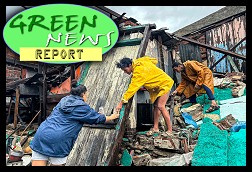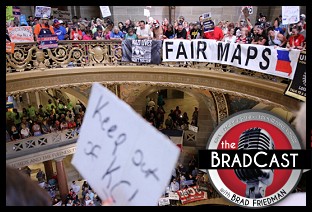
IN TODAY'S RADIO REPORT: Widespread devastation in the wake of record-breaking Hurricane Harvey; Officials warn the hardest work is just beginning; Explosions rock flooded Texas chemical plant; Trump revoked flood prevention reconstruction rules; PLUS: Looking ahead, looming battles in Congress over disaster relief and flood insurance... All that and more in today's Green News Report!
Got comments, tips, love letters, hate mail? Drop us a line at GreenNews@BradBlog.com or right here at the comments link below. All GNRs are always archived at GreenNews.BradBlog.com.
IN 'GREEN NEWS EXTRA' (see links below): EPA’s regulatory rollback would ensure that in disasters like Harvey, pollution is worse; Two new tropical storms take aim at U.S.; Trapped bakery workers spent days baking bread for Harvey victims; Harvey's toll on energy industry shows a Texas vulnerability; Why '500-year floods' are happening more frequently; MI demands Enbridge fix Mackinac Strait pipelines; Interior misspent $32 million thanks to lax oversight; EPA claims climate scientists trying to 'politicize' record storm; FERC approves controversial pipeline route over residents' objections; Coal payment loophole remains despite court ruling; Sea Shepherd pulls plug on Japan whale hunt... PLUS: Hurricane Harvey is what climate change looks like... and much, MUCH more! ...
STORIES DISCUSSED ON TODAY'S 'GREEN NEWS REPORT'...
- Hurricane Harvey's long trail of disaster:
- The latest on Hurricane Harvey and how you can help (PBS NewsHour)
- Harvey is an unprecedented disaster made worse by poor planning (Climate Progress):
Unless we get serious about both adaptation and mitigation, we won't be prepared when the next big storm hits. - Forewarning: Hell and High Water (Texas Tribune/Pro Publica):
Houston is the fourth-largest city in the country. It's home to the nation's largest refining and petrochemical complex, where billions of gallons of oil and dangerous chemicals are stored. And it's a sitting duck for the next big hurricane. Learn why Texas isn't ready. - Hurricane Harvey leaves widespread destruction in its wake:
- Harvey marks the most extreme rain event in U.S. history (Washington Post):
John Nielsen-Gammon, Texas state climatologist, said a rain gauge near Mont Belvieu at Cedar Bayou, about 40 miles east of Houston, had registered 51.9 inches of rain through late Tuesday afternoon. This total exceeds the previous record of 48 inches set during tropical cyclone Amelia in Medina, Texas in 1978. All rainfalls totals from this storm are still preliminary and require review. But, if verified, this amount breaks not only the Texas state rainfall record but also the record for the remaining Lower 48 states. - After disastrous rain around Beaumont and Port Arthur, Harvey surges inland (Washington Post)
- Harvey aftermath: Death toll rises; so do the floodwaters (CNN)
- Rescues continue as Harvey makes second devastating landfall (Chicago Tribune)
- Harvey to be costliest natural disaster in U.S. history, estimated cost of $190 billion (USA Today)
- Harvey is pulling away from Texas and Louisiana, and taking the flood risk with it (Washington Post)
- Hard work of recovery, cleanup begins after Harvey:
- A Sea of Health and Environmental Hazards in Houston’s Floodwaters (NY Times):
Officials in Houston are just beginning to grapple with the health and environmental risks that lurk in the waters dumped by Hurricane Harvey, a stew of toxic chemicals, sewage, debris and waste that still floods much of the city. Flooded sewers are stoking fears of cholera, typhoid and other infectious diseases. Runoff from the city’s sprawling petroleum and chemicals complex contains any number of hazardous compounds. Lead, arsenic and other toxic and carcinogenic elements may be leaching from some two dozen Superfund sites in the Houston area. - The Looming Consequences of Breathing Mold (The Atlantic):
Flooding means health issues that unfold for years. - VIDEO Katrina commander: The worst is yet to come (CNN)
- The health dangers from Hurricane Harvey’s floods (Washington Post)
- Most Harvey Flood Victims Uninsured, Face Big Bills Alone (AP):
[H]omeowners without flood insurance can possibly apply for federal disaster relief benefits, but those come in the form of low interest loans, a burden for those already struggling with too much debt. - Explosions at flooded Texas chemical plant
- ‘Pops,’ followed by smoke and fire, reported at storm-crippled Texas chemical plant (Washington Post):
The operators of a chemical plant left without power by floodwaters said Thursday that fires and other chemical reactions have been reported at the facility, and they warned that more problems could occur as rising temperatures make the highly flammable compounds inside more volatile and dangerous. - Crosby, Texas, Chemical Plant Explodes Twice, Arkema Group Says (NBC News)
- Harvey aftermath: More chemical fires possible as city loses clean water (CNN):
A spate of unexpected disasters is plaguing Texas cities nearly a week after Hurricane Harvey slammed into the coast...Harris County Sheriff Ed Gonzalez said nothing toxic was emitted and there was no imminent danger to the community. - Looming battles in Congress over disaster relief:
- The coming fight in Congress over Hurricane Harvey money, explained (Vox):
“You’re going to see demands for billions and billions of dollars to rebuild,” Larson said. “So Congress is going to make a ton of huge decisions: Will they be smart about how they spend the money? Will they spend billions in a way that will force taxpayers to simply come back and spend it again in a few years? What will they get done?” - VIDEO: Rep. Mike Pence in 2005 demanding spending cuts to offset Katrina disaster relief (Twitter)
- More than 20 Texas representatives and senators voted against Sandy aid. How will they vote on Harvey? (Michael Hiltzik, LA Times):
The representatives, and Republican Sens. Ted Cruz and John Cornyn, all voted against a $50.5-billion relief package for victims of 2012’s Superstorm Sandy when it came before them in January 2013. (The measure passed anyway.)...Most of the lawmakers who commented on the 2013 Sandy appropriation couched their opposition in terms of fiscal responsibility...Others demanded that every dollar spent on Sandy relief be balanced by a dollar cut somewhere else in the federal budget. As I wrote last year, when Louisiana congressmen who voted against Sandy were tasked with securing relief for victims of Hurricane Matthew, this position elevated the ideology of the balanced budget to an article of faith. - Despite Texans' Hurricane Sandy Votes, Local Republicans Pledge Harvey Relief Support (CBS New York)
- Fact Check: Ted Cruz's false claim that two-thirds of the Hurricane Sandy bill 'had nothing to do with Sandy' (Washington Post):
The Texas senator repeats myths about the funding for Sandy relief...So was the $50 billion bill filled with pork — two-thirds of which was unrelated to Sandy?No.
- Troubled National Flood Insurance Program faces reauthorization deadline:
- How Washington Made Harvey Worse (Politico:
A federal insurance program made Harvey far more costly—and Congress could have known it was coming. - The Weeds: the problem with the national flood insurance program (Vox)
- Harvey Could Reshape How and Where Americans Build Homes (Bloomberg)
- Now Comes the Uncomfortable Question: Who Gets to Rebuild After Harvey? (The Intercept)
- Trump Wants to Cut FEMA Budget Before the Next Major Hurricane (NewsWeek)
- Don't 'build better': Trump reinstated perverse flood reconstruction standards:
- Trump order undermines rebuilding better for future floods (Washington Post):
Two weeks before Harvey’s flood waters engulfed much of Houston, President Donald Trump quietly rolled back an order by his predecessor that would have made it easier for storm-ravaged communities to use federal emergency aid to rebuild bridges, roads and other structures so they can better withstand future disasters...The “requirements essentially said you had to build it back exactly the way it was, that you couldn’t take into consideration improvements in resiliency,” [Colorado Gov. John] Hickenlooper, a Democrat, said Tuesday. “We want to be more prepared for the next event, not less prepared.”
'GREEN NEWS EXTRA' (Stuff we didn't have time for in today's audio report)...
For a comprehensive roundup of daily environmental news you can trust, see the Society of Environmental Journalists' Daily Headlines page
- EPA’s regulatory rollback would ensure that in disasters like Harvey, pollution is worse (Climate Progress):
A loophole allows refineries to unleash unlimited pollution during shutdowns. - Harvey Is What Climate Change Looks Like (Politico):
But there’s an uncomfortable point that, so far, everyone is skating around: We knew this would happen, decades ago. We knew this would happen, and we didn’t care. Now is the time to say it as loudly as possible: Harvey is what climate change looks like. More specifically, Harvey is what climate change looks like in a world that has decided, over and over, that it doesn’t want to take climate change seriously. It’s time to open our eyes and prepare for the world that’s coming. - Two new tropical threats are taking shape in the Gulf of Mexico and Atlantic Ocean (Washington Post):
Hurricane Irma is expected to become a formidable cyclone, and its path puts the Caribbean and the Southeast U.S. coast at risk. It’s too soon to predict exactly where it will track once it reaches the Caribbean. But this time of year, history has taught us that these kinds of storms — beasts that form just off the coast of Africa, near the equator — are not to be ignored. - Flooding trapped workers at a Mexican bakery for two days. They spent it baking for Harvey victims. (Washington Post):
For two days, the trapped bakers churned out hundreds of pieces of bread, filling the shelves again with bolillos (a Mexican sandwich bread), kolaches and their signature pan dulce. They watched as, at the peak of flooding, water approached the doors of the building; fortunately, it never seeped in, and the store never lost electricity, Alvarado said later. - Harvey’s Toll on Energy Industry Shows a Texas Vulnerability (NY Times):
“The hurricane did what terrorists could only dream of and take a third of U.S. refinery capacity off line for days on end,” said Michael E. Webber, deputy director of the Energy Institute at the University of Texas at Austin...The Texas and Louisiana coasts took on their vital role because they link vast oil and gas resources, both inland and offshore, with Caribbean and Atlantic shipping channels. But the damage from Harvey, which arrived with hurricane force, has exposed a downside: vulnerability to storms that experts say are becoming more extreme because of climate change. - ‘500-Year Flood’ Could Happen Again Sooner Than You Think. Here’s Why. (NYTimes):
In the aftermath of Hurricane Harvey, President Trump tweeted that the storm had brought a “once in 500 year flood” to Houston, and expressed support for relief efforts. His words suggested the kind of catastrophic event that hadn’t been seen in the area for five centuries. But parts of Houston saw “500-year flooding” just last year. And in 2001, Tropical Storm Allison also delivered severe flooding to the area. - State Demands Enbridge Fix Mackinac Pipe Coating Gaps (Detroit News):
Gov. Rick Snyder on Wednesday ordered an accelerated and “aggressive” review of Enbridge Energy operations and maintenance procedures after the company revealed that at least two areas on twin pipelines running under the Straits of Mackinac are missing enamel coating. - Agency Misspent $32 Million, But Interior Has Held No One To Account (McClatchy DC):
Investigators have confirmed that a federal water agency misspent $32 million in funds meant to protect fish and wildlife in the Klamath basin of California and Oregon, a finding that Obama-era officials attempted to sideline after whistleblowers first alerted them to it. - Harvey's Damage in Texas Oil Country Creates Quandary for Congress (INside Climate News):
Even as the floodwaters continue to rise in East Texas, it's clear that Hurricane Harvey will force a new reckoning over major energy and climate policy questions. - EPA Says Climate Scientists Trying To 'Politicize' Texas Storm (Reuters):
The Environmental Protection Agency on Tuesday rejected a contention by scientists that the historic rainfall from Tropical Storm Harvey was linked to climate change, calling it 'an attempt to politicize an ongoing tragedy.' - Federal Agency OKs Gas Pipeline Project Fought By Residents (AP):
The Federal Energy Regulatory Commission has approved construction of a high-pressure pipeline that will carry natural gas from the shale fields of Appalachia, across northern Ohio and into Michigan and Canada, a decision likely to be a death blow for project opponents concerned about safety and property rights. - Court rules against Trump administration’s decision not to enforce coal rule (Cliamte Progress):
The coal industry still gets a win...[T]he loophole will remain open, since the Department of the Interior has already completed a separate effort through the normal rule-making process. The Interior’s revocation of the Obama-era coal valuation rule will be effective September 7, allowing coal companies to again engage in self-dealing (selling coal to subsidiaries at deflated prices to avoid paying full royalties before reselling it at normal prices). - Sea Shepherd Pulls Plug On Japan Whale Hunt (Yahoo News):
Activist group Sea Shepherd on Tuesday pulled the plug on its annual campaign to disrupt Japanese whaling, saying it can no longer match the country's military and economic power. - Duke Energy nixes nuclear plant, will invest $6 billion in solar and batteries (Climate Progress):
By year end, global solar capacity could equal nuclear; by 2022, solar could double nuclear. - Oil And Gas: What's Driving High Break-Even Prices On Public Lands? (E&E News):
Oil and gas producers might have a harder time breaking even in shale plays containing federally controlled land, but that may have little to do with the regulatory and permitting burdens associated with extracting hydrocarbons from public acreage, energy researchers say. - Texas isn’t alone–South Asia is also suffering the horrors of climate change (Climate Progress):
Millions have been displaced and more than a thousand people have died across Nepal, India, and Bangladesh as floods rage. - Greens Sue To Stop Rollback Of Yellowstone Grizzly Protections (The Hill):
Environmental groups are suing the Trump administration over its decision to remove the Yellowstone grizzly bear’s protections as a threatened species. - Senators' Silence Kills Probe Into Zinke's Alleged Alaska Threats (The Hill):
The Interior Department’s Office of Inspector General (OIG) is closing its investigation into Secretary Ryan Zinke’s alleged threats against an Alaska senator during an ObamaCare fight last month after the lawmaker and her in-state colleague refused to participate in the probe. - Why Hurricane Harvey became so extreme (Scientific American):
Why did Hurricane Harvey so quickly explode from a Category 1 hurricane to Category 4?...Masters also wrote a fascinating article on why the jet stream is getting weird. - NASA shocker: Last month was hottest July, and hottest month, on record (Climate Porgress):
It's the first time we've seen such a record month in the absence of an El Niño boost. - The Uninhabitable Earth: When will climate change make earth too hot for humans? (New York Magazine):
Famine, economic collapse, a sun that cooks us: What climate change could wreak - sooner than you think. - A beginner's guide to the debate over 100% renewable energy (Vox):
Clean-energy enthusiasts frequently claim that we can go bigger, that it's possible for the whole world to run on renewables - we merely lack the "political will." So, is it true? Do we know how get to an all-renewables system? Not yet. Not really. - No country on Earth is taking the 2 degree climate target seriously (Vox):
If we mean what we say, no more new fossil fuels, anywhere.
FOR MORE on Climate Science and Climate Change, go to our Green News Report: Essential Background Page


 A Pretty Weak 'Strongman': 'BradCast' 10/30/25
A Pretty Weak 'Strongman': 'BradCast' 10/30/25 'Green News Report' 10/30/25
'Green News Report' 10/30/25
 Proposal for 'First Politically Viable Wealth Tax' Takes Shape in CA: 'BradCast' 10/29/25
Proposal for 'First Politically Viable Wealth Tax' Takes Shape in CA: 'BradCast' 10/29/25 Monster Storm, Endless Wars, Gamed Elections:
Monster Storm, Endless Wars, Gamed Elections: 'Green News Report' 10/28/25
'Green News Report' 10/28/25 Let's Play 'Who Wants
Let's Play 'Who Wants Sunday 'Cartoonists Dilemma' Toons
Sunday 'Cartoonists Dilemma' Toons Exiled NOAA Scientists Resurrect Critical Disaster Database: 'BradCast' 10/23/25
Exiled NOAA Scientists Resurrect Critical Disaster Database: 'BradCast' 10/23/25  'Green News Report' 10/23/25
'Green News Report' 10/23/25 Trump-Allied GOP Partisan Buys Dominion Voting Systems: 'BradCast' 10/22/25
Trump-Allied GOP Partisan Buys Dominion Voting Systems: 'BradCast' 10/22/25 Trump, Republican Law(lessness) & (Dis)Order: 'BradCast' 10/21/25
Trump, Republican Law(lessness) & (Dis)Order: 'BradCast' 10/21/25 'Green News Report' 10/21/25
'Green News Report' 10/21/25 Celebrating 'No Kings': 'BradCast' 10/20/25
Celebrating 'No Kings': 'BradCast' 10/20/25 Sunday 'How It Started' Toons
Sunday 'How It Started' Toons SCOTUS Repubs Appear Ready to Gut Rest of Voting Rights Act: 'BradCast' 10/16/25
SCOTUS Repubs Appear Ready to Gut Rest of Voting Rights Act: 'BradCast' 10/16/25 'Green News Report' 10/16/25
'Green News Report' 10/16/25 The 'Epstein Shutdown' and Other Autocratic Nightmares: 'BradCast' 10/15/25
The 'Epstein Shutdown' and Other Autocratic Nightmares: 'BradCast' 10/15/25 Group Vows to Block MO's GOP U.S. House Gerrymander: 'BradCast' 10/14/25
Group Vows to Block MO's GOP U.S. House Gerrymander: 'BradCast' 10/14/25 Trump Labor Dept. Warns Trump Policies Sparking Food Crisis: 'BradCast' 10/9/25
Trump Labor Dept. Warns Trump Policies Sparking Food Crisis: 'BradCast' 10/9/25 Trump's Losing Battles: 'BradCast' 10/8/25
Trump's Losing Battles: 'BradCast' 10/8/25 Trump, Roberts and His Stacked, Packed and Captured SCOTUS: 'BradCast' 10/7/25
Trump, Roberts and His Stacked, Packed and Captured SCOTUS: 'BradCast' 10/7/25 Trump Attempting His 'Invasion from Within': 'BradCast' 10/6/25
Trump Attempting His 'Invasion from Within': 'BradCast' 10/6/25 Biden Budget Expert: Mass Firings in Shutdown 'Illegal': 'BradCast' 10/2/25
Biden Budget Expert: Mass Firings in Shutdown 'Illegal': 'BradCast' 10/2/25 Why is DOJ Suing 'Blue' States for Their Voter Databases?: 'BradCast' 10/1/25
Why is DOJ Suing 'Blue' States for Their Voter Databases?: 'BradCast' 10/1/25
 VA GOP VOTER REG FRAUDSTER OFF HOOK
VA GOP VOTER REG FRAUDSTER OFF HOOK Criminal GOP Voter Registration Fraud Probe Expanding in VA
Criminal GOP Voter Registration Fraud Probe Expanding in VA DOJ PROBE SOUGHT AFTER VA ARREST
DOJ PROBE SOUGHT AFTER VA ARREST Arrest in VA: GOP Voter Reg Scandal Widens
Arrest in VA: GOP Voter Reg Scandal Widens ALL TOGETHER: ROVE, SPROUL, KOCHS, RNC
ALL TOGETHER: ROVE, SPROUL, KOCHS, RNC LATimes: RNC's 'Fired' Sproul Working for Repubs in 'as Many as 30 States'
LATimes: RNC's 'Fired' Sproul Working for Repubs in 'as Many as 30 States' 'Fired' Sproul Group 'Cloned', Still Working for Republicans in At Least 10 States
'Fired' Sproul Group 'Cloned', Still Working for Republicans in At Least 10 States FINALLY: FOX ON GOP REG FRAUD SCANDAL
FINALLY: FOX ON GOP REG FRAUD SCANDAL COLORADO FOLLOWS FLORIDA WITH GOP CRIMINAL INVESTIGATION
COLORADO FOLLOWS FLORIDA WITH GOP CRIMINAL INVESTIGATION CRIMINAL PROBE LAUNCHED INTO GOP VOTER REGISTRATION FRAUD SCANDAL IN FL
CRIMINAL PROBE LAUNCHED INTO GOP VOTER REGISTRATION FRAUD SCANDAL IN FL Brad Breaks PA Photo ID & GOP Registration Fraud Scandal News on Hartmann TV
Brad Breaks PA Photo ID & GOP Registration Fraud Scandal News on Hartmann TV  CAUGHT ON TAPE: COORDINATED NATIONWIDE GOP VOTER REG SCAM
CAUGHT ON TAPE: COORDINATED NATIONWIDE GOP VOTER REG SCAM CRIMINAL ELECTION FRAUD COMPLAINT FILED AGAINST GOP 'FRAUD' FIRM
CRIMINAL ELECTION FRAUD COMPLAINT FILED AGAINST GOP 'FRAUD' FIRM RICK SCOTT GETS ROLLED IN GOP REGISTRATION FRAUD SCANDAL
RICK SCOTT GETS ROLLED IN GOP REGISTRATION FRAUD SCANDAL VIDEO: Brad Breaks GOP Reg Fraud Scandal on Hartmann TV
VIDEO: Brad Breaks GOP Reg Fraud Scandal on Hartmann TV RNC FIRES NATIONAL VOTER REGISTRATION FIRM FOR FRAUD
RNC FIRES NATIONAL VOTER REGISTRATION FIRM FOR FRAUD EXCLUSIVE: Intvw w/ FL Official Who First Discovered GOP Reg Fraud
EXCLUSIVE: Intvw w/ FL Official Who First Discovered GOP Reg Fraud GOP REGISTRATION FRAUD FOUND IN FL
GOP REGISTRATION FRAUD FOUND IN FL








































